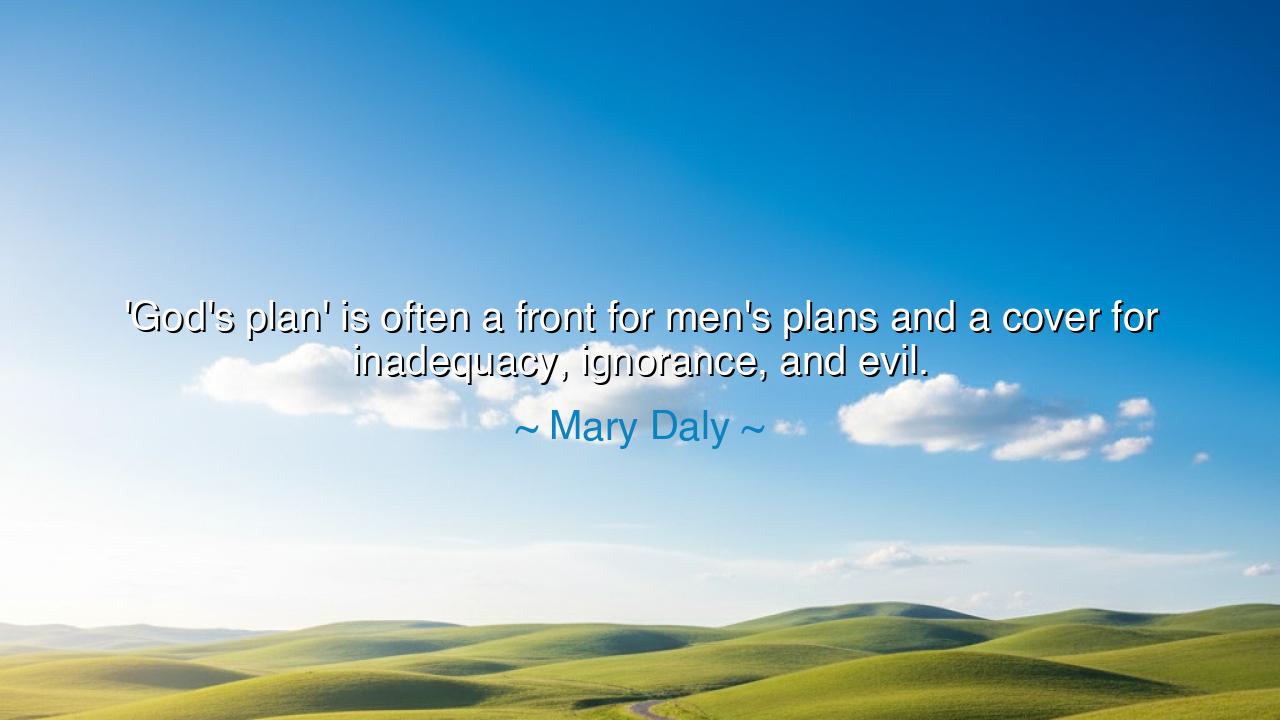
'God's plan' is often a front for men's plans and a cover for
'God's plan' is often a front for men's plans and a cover for inadequacy, ignorance, and evil.






Listen, O children of wisdom, to the words of Mary Daly, a woman who sought to understand the deep currents of human nature, power, and the ways in which the divine is often used to mask the intentions of men. She said, “‘God’s plan’ is often a front for men’s plans and a cover for inadequacy, ignorance, and evil.” These words echo through the chambers of history, a reminder that the divine, the holy, and the sacred are often invoked not to serve the greater good, but to hide the flaws and greed of those who claim to wield power. Daly’s insight calls us to examine the ways in which human desires are cloaked in divine authority, and how the invocation of God’s will can sometimes be a shield for selfishness, oppression, and ignorance.
Consider, O wise ones, the notion of God’s plan. In many cultures and religions, this phrase has been used to justify the actions of rulers, priests, and other powerful figures. It is a comforting idea, one that suggests that the events of the world are part of a grand, divine design, beyond human comprehension. Yet, Daly warns us that often those who invoke God’s plan do so not to elevate the divine but to conceal their own motives. They claim to speak in the name of God, to act as His instruments on Earth, while in truth they are pursuing their own desires—power, control, and dominance—under the guise of the holy. It is a clever deception, one that has been employed throughout the ages, to bend others to one's will by claiming divine authority.
In the ancient world, O children, we see countless examples of this deception. The Pharaohs of Egypt claimed to be gods, chosen by divine will to rule over the people. They used the idea of divine authority to justify their excesses, their oppression of the masses, and their wars of conquest. Pharaoh Ramses II, for example, painted himself as the embodiment of divine will, using this to strengthen his grip on power. The priests who surrounded him, too, wielded the idea of divine power to control the people, convincing them that to question the king was to question God. And in the same way, we see throughout history how those who held power invoked God’s will to justify actions that were, in truth, driven by their own human desires.
Consider also the Crusades, where leaders justified the slaughter of Muslims and Jews under the banner of the holy cross. These wars were proclaimed to be a divine mission, a holy war commanded by God. Yet, as we look back upon these events, we see that they were often motivated by earthly desires—land, wealth, and the desire for political control. The idea of God’s plan was used to justify unspeakable acts of violence and bloodshed, all under the guise of righteousness. In such cases, God’s plan was not a divine directive, but a cover for the true nature of human ambition and cruelty.
Daly’s words challenge us to look beyond the words of authority, to see the human desires and flaws that often lie beneath the claim of divine justification. She calls us to question when God’s will is invoked as a shield for wrongdoing, for oppression, or for actions that cause harm. It is not enough to simply accept that God is behind every act of power; we must scrutinize the motives of those who claim to act in His name. Daly’s message is clear: God’s plan is often used as a cloak for human inadequacies, ignorance, and evil. The divine is not a weapon for selfish gain, but a source of love, justice, and mercy.
So, O children, the lesson is this: we must be vigilant in the face of those who use divine authority to justify their actions. Whether in politics, religion, or society, the invocation of God’s will should never be an excuse for oppression, violence, or injustice. True power comes not from imposing divine authority for personal gain, but from understanding the true nature of God's love—a love that calls us to compassion, justice, and truth. We must recognize that true divinity is not something used to control others, but a force that empowers all to act with goodness and humility.
As you move through the world, O children, remember that not all who claim to speak in the name of God do so with righteousness. Question when you hear God’s will used as a cover for evil actions, and seek to expose the truth behind those words. Let your actions be guided by love, understanding, and justice, and seek to build a world where divine authority is truly used to uplift all, not to oppress the weak. In this, you will fulfill the true purpose of divine will—to create a world of peace, equity, and shared humanity.






AAdministratorAdministrator
Welcome, honored guests. Please leave a comment, we will respond soon